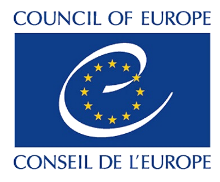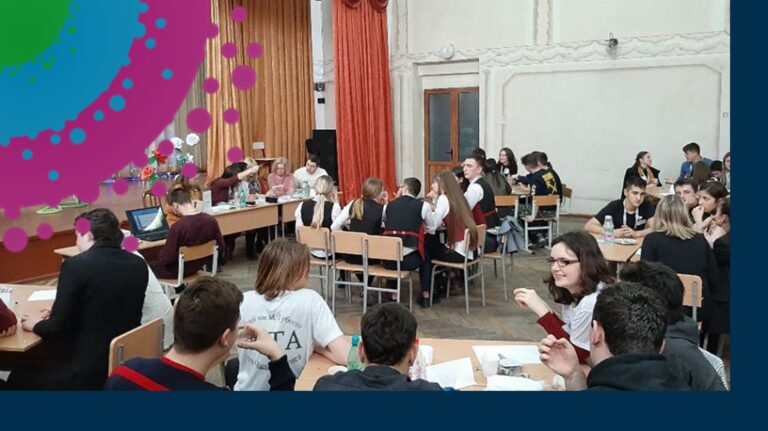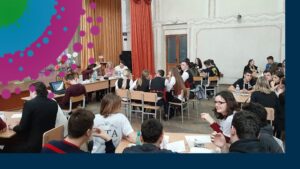Current status
Submitted
Discover more
After a contribution is submitted to BePART Forum, the initiative is marked as “Submitted”; as other partners involved in the initiative submit information from their side, the initiative is marked as “Under review” and goes through the validation process; twice a year, initiatives are validated by the BePART Working Group at the Council of Europe. Successful initiatives are marked as “Validated”. Do you want to learn more – click here
Contributor(s)
First contributor: Asociatia Nationala a Femilor din Mediul Rural Romania
Summary
An activity on local democracy: youth involvement in village administration. A local partnership: Local Council, Local schools, NGOs. There were organized “local elections” for the teenagers (14-18years old) to understand the main aspects of election steps, authorities’ responsibilities, and local participation.
Administrative level
Local (Domnesti village, Arges county)
Year of implementation
2012
Policy area(s)
- (Local) Development and Planning
- Education, culture, and sport
- Youth
Further details
/
Sorry, no records were found. Please adjust your search criteria and try again.
Sorry, unable to load the Maps API.
Comunitatea Montana Iezer Muscel
Civil society organisation
Contact info
/
Tipology of involvement in the initiative
- Organising
- Funding
- Participating with a direct involvement
ANFMR
Civil society organisation
Contact info
/
Tipology of involvement in the initiative
- Initiating (i.e., advocating for and starting the process)
- Organising
- Participating with a direct involvement
Ministry of Education and Culture
Public Authority
Contact info
/
Tipology of involvement in the initiative
- Indirectly impacted by the process
ANFMR
Civil society organisation
Contact info
/
Tipology of involvement in the initiative
- Initiating (i.e., advocating for and starting the process)
- Organising
- Participating with a direct involvement
Domnesti, Arges Local Council and Mayor
Public Authority
Contact info
/
Tipology of involvement in the initiative
- Organising
- Participating with a direct involvement
Level of Participation
- Information
- Dialogue
- Partnership
Discover more
By level of participation we refer to the type of involvement in the decision-making process. The levels are identified by the intensity of participation: going from “information” to “consultation” to ” dialogue” to “partnership”. Do you want to learn more – click here
Developed practice(s)
Valuable information regarding local administration process, starting with the most democratic step: local election. An opportunity of dialogue explaining and understanding what local policy means; how can you be a good citizen taking active part at local elections.
A fruitful partnership: local authorities, NGOs, and students in understanding the democratic process of elections and responsibilities involved the later decision-making process/strategy.
A lesson of democracy, transparency on behalf of the local authorities; social responsibilities proved by teachers and students’ social engagement.
Step(s) of the political decision-making process at which the practice was implemented
- Inputs/Incentive ideas for policy
- Drafting of policy
- Decision – making on policy
Discover more
There are six different steps of the political decision-making process: agenda setting, drafting of policy, decision-making, implementation of policy, monitoring and reformulation of policy. Each step offer opportunities for CSOs and public authorities to interact. Do you want to learn more – click here
How the initiative was implemented
Situation
Teachers at the local high school identified the teenagers target group. The mayor and local councils accepted to explain them the steps and rules of local elections. Together with Iezer Muscel Mountain Community and ANFMR, the steps of local elections were implemented – simulated by students. They elected their mayor and local councillors and discussed the local development strategy. Each step was supported by the mayor and councillors’ advice. Interesting debates and initiatives were proposed. The youths realized how difficult is to solve the inhabitants’ problems and what local administration means.
A very successful experience that may be implemented in other villages.
Activities performed
- Simulation of local elections organised by the local students.
- All steps of local elections were simulated.
Tools and mechanisms applied
- Identify the electing people: students at the local school (14-18 years old).
- Logistics and strategies support on behalf of the LC.
- Simulation of the elections at the Town Hall.
- Logistics offered by the LC to organize and register the election results.
- NGOs involvement in administration activities.
- Transparency, responsibility, marketing, and communication.
Goals of the civil participation initiative
At community level
To experience a democratic right
From Civil society organisation’s perspective
People involvement in local community policy
From Public Authority’s Perspective
Youths’ initiation in local problems
Results expected prior to the implementation
- To understand the role of elections
- To make youth aware of their rights and duties as well
- To promote social involvement
Immediate results achieved after implementation
- Youths’ mayor and LC election
- A democratic exercise meant to involve youths in local community life
- Understanding the means of democracy, responsibility, and participation
Long-term impact
- Stimulate the youths’ interest in village public administration and policy
- Encourage local participation to relevant village activities
Practice lessons learnt (obstacles and solutions)
| Agency (i.e., political conditions/power structures) | Obstacles | Shyness, lack of democratic exercise |
| Solutions | Informing campaigns on major problems of the local community | |
| Legislative | Obstacles | / |
| Solutions | / | |
| Administrative | Obstacles | / |
| Solutions | Very cooperative local administration | |
| Socio-cultural | Obstacles | Low interest in local administration |
| Solutions | Elections simulated to involve youth in village administration | |
| Economic | Obstacles | Identifying financing sources |
| Solutions | Mayor’s involvement and examples of good practice | |
| Human capital | Obstacles | / |
| Solutions | Very cooperative teenagers | |
| Other | Obstacles | / |
| Solutions | / |
Further information
/
Self-assessment
The self-assessment presents the opinion of the contributor about on what extent the following principles for Civil Participation have been reflected in the implementation of the initiative/practice/case-study, ranging from 1 (min) to 4 (max) (N/A: not applicable, do not know)
| Openness | 3 |
| Explanation | Openness is a tool for local administration to implement its policy. |
| Trust | 3 |
| Explanation | Openness leads to trust. |
| Independence | 4 |
| Explanation | Most of Romanian NGOs are independent bodies. |
| Participation | 4 |
| Explanation | NOGs may support local authorities in encouraging people/inhabitants’ participation. |
| Transparency | 3 |
| Explanation | Local administrations have to work with this respect. |
| Accessibility | 3 |
| Explanation | Too much bureaucracy-difficult to be understood by rural population. |
| Non-discrimination | 3 |
| Explanation | NGOs support non-discrimination. |
| Inclusiveness | 4 |
| Explanation | NGOs encourage participation and inclusiveness. |
| Accountability | 3 |
| Explanation | / |
Thank you for wanting to share your experience on the BePART platform!
Learn more about the submission process, or just fill the form below.



